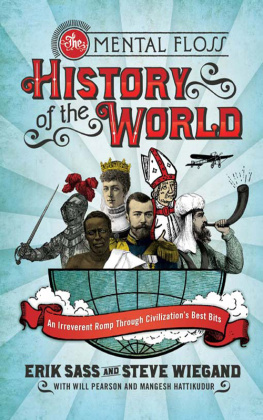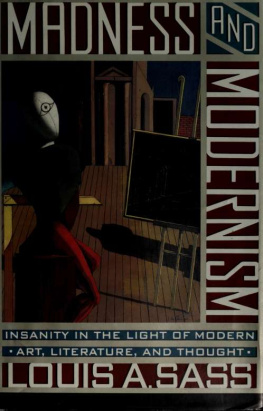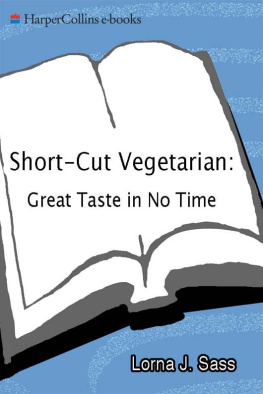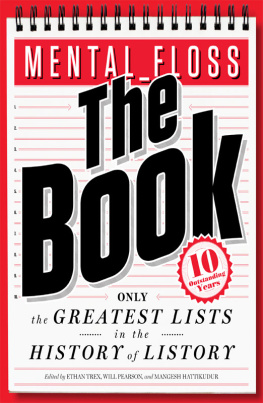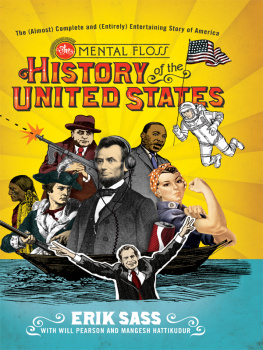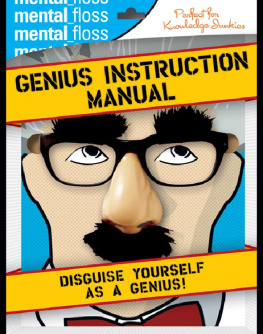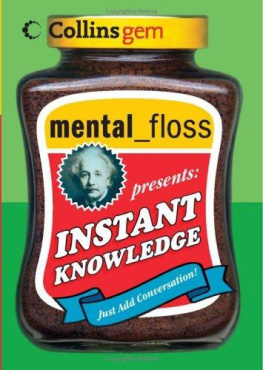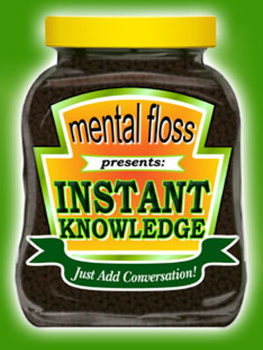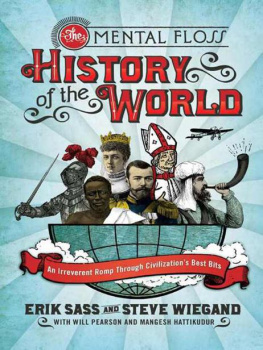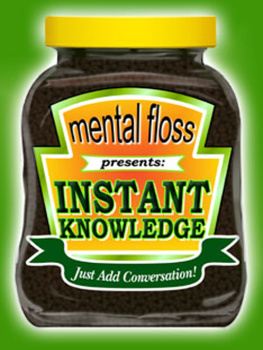The Mental Floss History of the World
An Irreverent Romp Through Civilizations Best Bits
Erik Sass and Steve Wiegand with Will Pearson and Mangesh Hattikudur

Contents
Africa and After
(60,000 BCE1500 BCE)
Chaos and Control
(1500 BCE500 BCE)
Athens, Alexander, and All That
(500 BCE0 BCE)
Theres No Place Like Rome (Except China, Persia, India, Mexico, and Peru)
(1 CE500 CE)
The Not-Really-That-Dark (Unless You Lived in Europe) AGES
(5001000)
The Fair-To-Middlin Ages (Even If You Lived in Europe)
(10001300)
Renaissance, Anyone? (And How About Genocide and Slavery?)
(13001575)
War and Slavery (And, Uh, Enlightenment)
(15751750)
The Age of Liberation, Fragmentation, Stagnation, and Plain Ol Nations
(17501900)
The Empires Strike Out
(19001930)
To The Brink of the Abyss
(19311962)
One World
(19632007)
Oh Yea, Canada
To paraphrase Yogi Berra, Steve and Erik would like to thank mental_floss editors Will Pearson and Mangesh Hattikudur for making this book necessary, along with HarperCollins editor Stephanie Meyers for making it (we hope) readable.
Steve would also like to thank his sister, Deborah Daly, for her encouragement and interest in whats been going on in the world for the last 20,000 years. And, of course, his wife, Ceil, and daughter, Erin. Just for putting up with him.
Erik would like to thank his parents, Karen and Steve, for reproducing and imparting their love of learning, and his older brother, Adam, for listening to his constant prattle with the appearance of interest. For demonstrating that reading and writing about history can actually be interesting, he owes a debt of gratitude to Mary-Therese Pasquale-Bowen, Colonel Dan D.A. Allen, USAF (Ret.), and Duke history professors Malachi Hacohen, Kent Rigsby, Peter English, and Kristin Neuschel. Special thanks as well to Justin and Juliet Schwab for their Classical expertise.
Will and Mangesh would like to thank Cathy Hemming for her wise counsel, Steve Ross for his confidence in mental_floss, and the entire Collins crew for their enthusiastic support. But most of all, wed like to thank Stephanie Meyers for being the greatest editor in the history of editors. And weve clearly been studying our history.
BY ERIK SASS
We know that 99% of history, as they teach it, is mind-numbingly boring. And were sorry about that; we cant change what happened in your youth.
But this book is about to make history, by making history interesting. Why? Because history is an edge-of-your-seat thrill ride with all the makings of a Hollywood blockbuster. You want action? We got action. Sex and violence? Plenty of both. Psychopathic mass murderers? Psychopathic mass murderers run history! And the best part is, its all real.
In the following pages, youll read about babies on opium, chicken-flavored beer, cosmetic testicle beads, undercover czars, and gin as a way of life. Weve also got multibillion dollar heists, secrets from Central American jungles, a duchess who rode through town naked to get her husband to lower taxes, and Roman orgies so scandalous that even the Romans were scandalized.
Of course, if its the serious stuff you crave, weve got that, too. From the religion that gave birth to Christianity (were not talking Judaism), to why the Black Death may not have been such a bad thing, to the lurid details of how a country of 300 million people wasnt just conquered, but conned into thinking it was their idea, theres no shortage of substance.
A natural question about any single-volume history of the world should be: Is everything here? The straight answer is: no. Not that we didnt try. Sadly, HarperCollins rejected our original 500 million-page manuscript as overenthusiastic and hard on the back. (Whether it would have been marketable as the first book visible from space is still up for debate.) And while this version does omit a few details, we think we did alright. Theres a wealth of fun facts here, and maybe three-quarters of the important stuff. Luckily, theres a surprising degree of overlap.
On that note, some people claim history is a serious business, and we could lay some solemn jive on you, like those who do not know their history are doomed to repeat it. Unfortunately, thats not necessarily true. As youll see in the following pages, history is full of people who knew plenty about history, but kept on repeating the same stupid mistakes again and again anyway.
But that doesnt mean the past isnt worthwhile in its own right. History is funny, thrilling, heartbreaking, transcendent. Theres laughing and gasping, crying, and so much more. And history gives us hope. Because maybe those solemn historians were right: with a little luck, maybe we will learn something that helps us dodge the next bullet.
So we encourage you to read, enjoy, and try to pay attention. Because there is going to be a quiz when youre finished. Its called the future.
AFRICA AND AFTER
(60,000 BCE1500 BCE)
IN A NUTSHELL

If theres one thing you can say about human beings, its that were always hungry. When modern humans ( Homo sapiens sapiens ) left Africa to conquer the globe more than sixty thousand years ago, they settled near sources of food, and those areas that produced more food became more populated. Some groups found forests with game to hunt, while others wandered grasslands, tending herds of cows. In Stone Age Mexico, coastal peoples subsisted on shellfish for thousands of years, leaving a huge heap of clam shells 240 feet long, 90 feet wide, and 21 feet tall.
Another thing about us: we dont like to share. Tribes constantly battled for territory, and some were pushed into less friendly environmentsbut nomads made the best use of limited resources. Arabs conquered the vast Arabian Peninsula by taming the camel, a hardy desert animal that carried them between lush oases. Central Asians took to horse- and sheepherding, ranging across thousands of miles in search of rare good pastures. Inuit learned to build homes out of ice.
But in terms of calories per acre, grain cultivation feeds many more people than fishing, hunting, or raising domestic animals. Grain cultivation began around 9000 BCE and soon spread around the world, and places that grew grain experienced a population explosion (oh yeah, apparently we also like to have sex a lot ). Soon, there was so much food that some people could stop working in the fields and specialize in crafts. Expert potters, weavers, and masons were soon followed by tailors, leather tanners, miners, and other trades. Yes, that includes the worlds oldest profession.
Around 8000 BCE, the worlds first civilizationsdefined as people living in citiesbegan appearing. The craftspeople lived together in encampments for safety against rival groups and for convenience of trade. Cities also became centers of governmentin most cases, likely a hereditary monarchy descended from old tribal authority. Little is known about the worlds first governments, but they were probably dominated by a single family or clan passing authority from generation to generation, with a dominant man becoming ruler each time. In prehistory, governments along matriarchal (woman-centered) or communal (leaderless) lines may have existed, but by the beginning of recorded history, these had been snuffed out. Each of the worlds first civilizations was ruled by one man, a king. Men have hogged the remote ever since.

